Sergio Aguero – The Greatest Striker In Premier League History?
With Gabriel Jesus starting his Manchester City career with a bang following his arrival in January, some commentators forecast the beginning of the end for Sergio Agüero’s stellar City career. Indeed, it has been difficult to escape the feeling at times this season that perhaps Agüero simply doesn’t fit Guardiola’s model of a centre forward. However, with Jesus’ untimely injury, Agüero has once again been thrust into action and has responded as he tends to do; with goals. Another important strike against Liverpool on Sunday followed his effort – although ultimately in vain – against Monaco in midweek. Indeed, it is hard to understate Sergio Agüero’s importance to Manchester City since he signed for £38million from Atletico Madrid back in 2011, with his record in this time being nothing short of spectacular, netting 115 goals in 172 league games. But how does Agüero compare with other legendary strikers of the Premier League era? In order to properly gauge the Argentine’s impact, we have compared and contrasted his stats with those of nine of the best strikers to grace the Premier League since its inception. The strikers we have chosen for comparison are:
- Thierry Henry
- Ruud van Nistelrooy
- Robin van Persie
- Alan Shearer
- Michael Owen
- Didier Drogba
- Andrew Cole
- Robbie Fowler
- Wayne Rooney
Total Goals
We begin by looking at the total number of goals scored by these strikers scored in the Premier League:
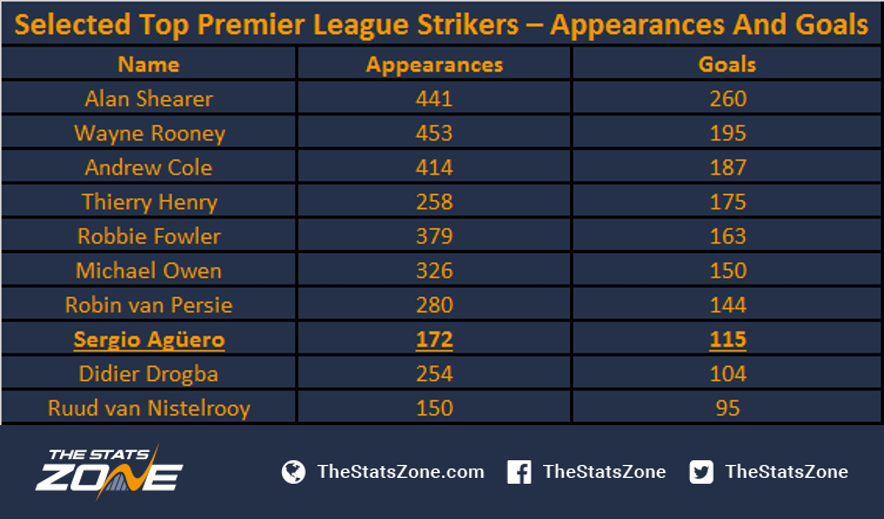
The strikers we have chosen for comparison have all scored at least 95 Premier League goals, with Ruud van Nistelrooy hitting this figure during his time at Manchester United. Agüero himself is still some way off the record Premier League goalscorer Alan Shearer’s mark of 260 goals. This however is to be expected given the fact that Shearer played in the Premier League for 14 seasons and amassed 441 appearances during his spells at Blackburn and Newcastle. In comparison, Agüero’s 115 goals have come in five full seasons (plus the current campaign) and 172 appearances. In all, Agüero falls eighth in our list of strikers, although again this is to be expected given the number of appearances he has made in comparison with the other strikers listed. The only player with a comparable number of appearances is Ruud van Nistelrooy, and in this respect, Agüero’s record compares favourably with the prolific former Manchester United striker, scoring 20 more goals in just 22 more appearances.
Goals Per Game
As the above analysis shows, merely examining the number of goals scored doesn’t give us the full picture when it comes to considering how good Agüero may be, given the stat is bound to favour those with a longer Premier League career. As such, we moved onto to look at the goals per game ratio of the strikers in our comparison:
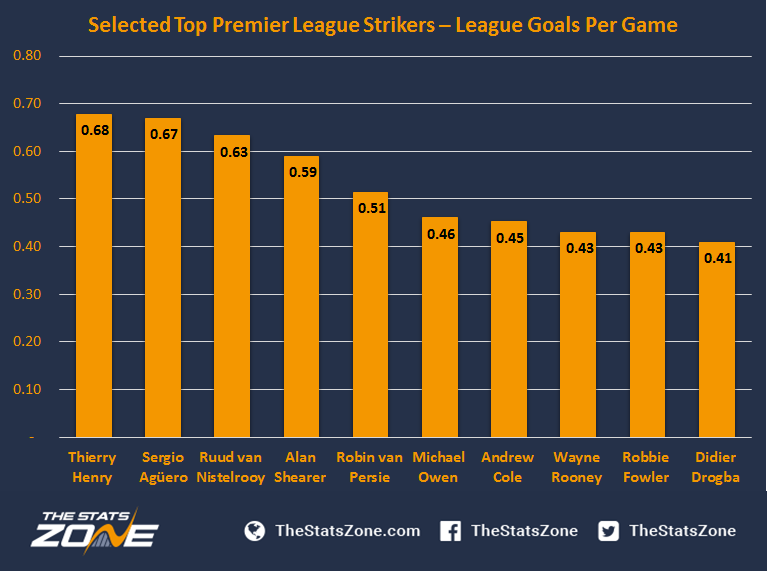
Looking at these statistics, Agüero is just beaten into top spot by Thierry Henry, averaging 0.67 goals per game against the Frenchman’s 0.68. When you look at the figures of luminaries such as Didier Drogba at 0.41 goals per game and Wayne Rooney at 0.43, this record looks all the more impressive. In this respect, it is clear that Agüero is every bit as deadly as the very best strikers in Premier League history.
Minutes Per Goal
Given Agüero’s injury record, you would expect that some of the games he has played have either been curtailed by injury, or have been substitute appearances in an attempt to regain match sharpness. This of course means that not all of Agüero’s 172 matches will have been a full 90 minutes, which makes his record of 0.67 goals per game even more impressive. Of course, the same issue could apply to the other strikers in our comparison so we decided to delve deeper into the stats and look at the average number of minutes it takes our strikers to score a Premier League goal.
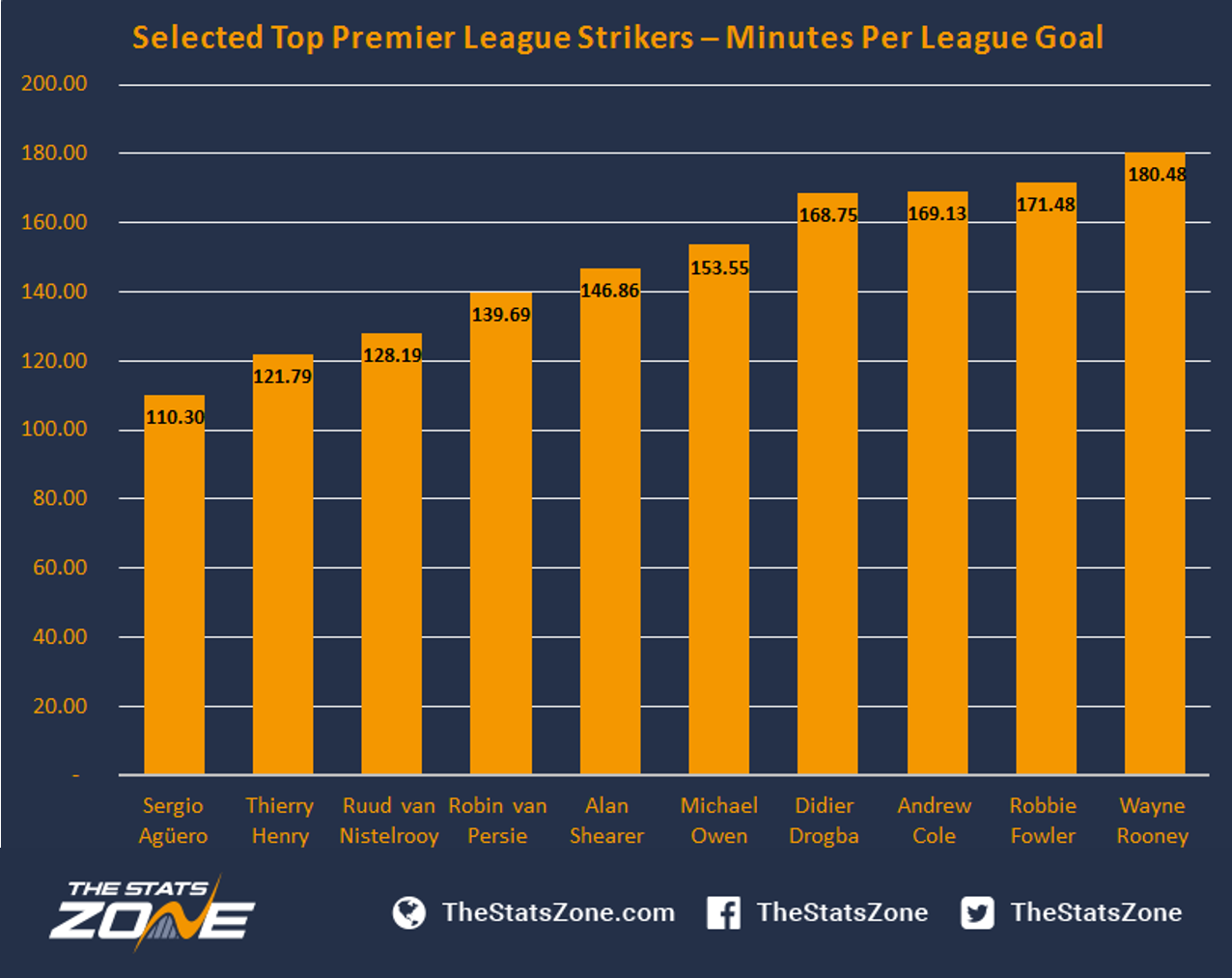
As can be seen, Agüero’s record is even more impressive when analysed in this way, with his closest challenger Thierry Henry needing an extra 11.49 minutes to score a goal. His figures look even more exemplary when compared to his Manchester United rival Wayne Rooney, who scores a goal every 180.48 minutes, which is an extra 70 minutes more than Agüero needs to find the back of the net. Indeed, Agüero’s record in this regard is better than any Premier League player in history who has scored at least 20 goals (although interestingly his colleague at City, Kelechi Iheanacho, has scored his 12 Premier League goals at a rate of a goal every 102.92 minutes).
Best League Season
We then decided to look at Sergio Agüero’s most prolific individual season in the Premier League, to see how this compared with the other strikers in our comparison. We also compared this to the most prolific goal scoring season by anyone since the Premier League season was reduced to 38 games. The highest number of goals scored in a 38 game season is 31, which has been achieved three times, with one of the strikers in our comparison Alan Shearer, being joined by Cristiano Ronaldo and Luis Suárez. Suárez’s 31 goals in 2013/14 came in just 33 games, as opposed to Ronaldo’s 34 games and Shearer’s 35, so we will use his figure of 0.94 goals per game as the benchmark to judge Agüero and our other strikers.
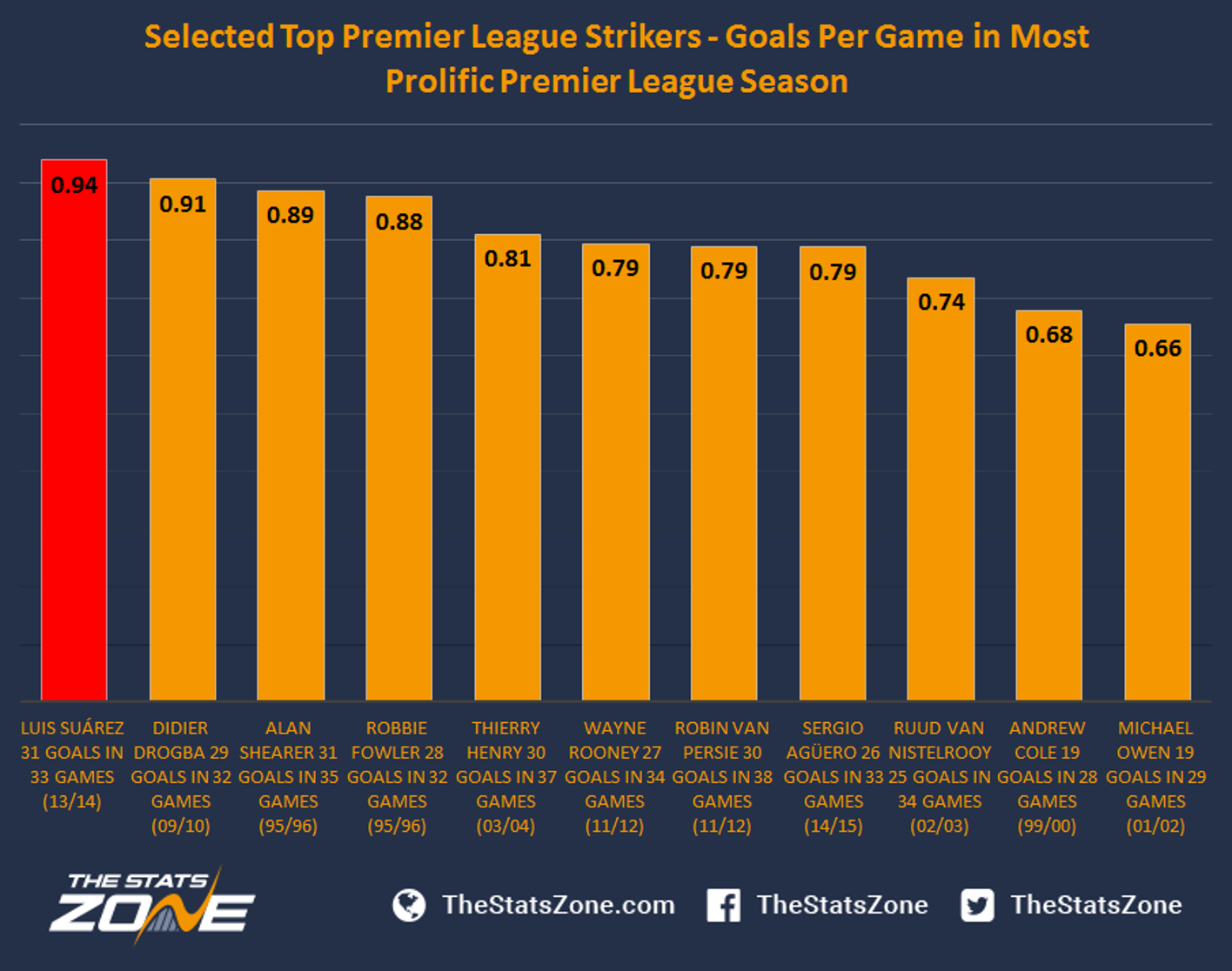
As can be seen from the data, Agüero doesn’t fare quite as well in this comparison, both in terms of his top goal tally of 26 and his goals per game ratio when scoring these goals of 0.79 goals per game. Both of these figures leave him behind six of the strikers in our comparison and it is perhaps surprising that given his talent, he has yet to produce a season where he has topped 30 goals. Of course, his injury record is relevant in this regard and given his overall goals per game record is still impressive, it points to a very consistent goalscorer rather than perhaps someone who has merely had one or two stand-out seasons.
Impact On Team
Having seen that Agüero’s individual record generally compares highly favourably with all of the strikers chosen for comparison, we decided to look at the impact this success has had on his team compared to the other strikers. After all, a striker's goals should only really count if they contribute towards the team’s success (although some strikers may not agree…). In order to do this, we decided to begin by examining the win percentage of each of our strikers to gauge how their individual performances impacted on their respective team’s results.
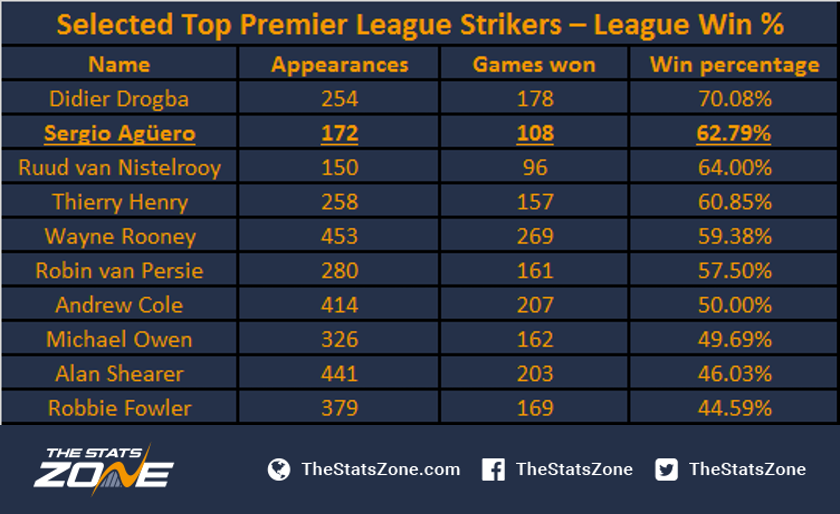
It is immediately apparent than Agüero’s goals have contributed to a successful Manchester City team, with City winning 62.79% of the games in which he has played. This is the third highest percentage of the players in our list behind Ruud van Nistelrooy at 64% and Didier Drogba, who won an incredible 70.08% of the Premier League games he played. Indeed, Agüero’s record was even more impressive before this season, with City’s slightly inconsistent form meaning his win percentage in the current campaign stands at a comparatively modest 54.55%. Of course, it should be noted that those playing for more successful teams generally will have an advantage in this respect, and the baseline for Manchester City’s success with or without Agüero would differ more than, for example, Newcastle or Blackburn’s when Alan Shearer was playing and achieving a win rate of just 46.03%. In this respect, the argument could work both ways, with it being said the team is performing better because of an individual’s goals, or alternatively a player is performing better because of the team’s more general success. Indeed, supporters of Shearer may argue his record is all the more impressive coming as it does in two sides who - apart from Blackburn’s 1995 title win - did not have as much collective success as many of the teams the other strikers in our comparison played for.
In a further attempt to more accurately gauge the importance of the strikers to the teams they played for, we decided to look at the percentage of their team’s overall goals that were scored by each of them. Given that Agüero has only played in the Premier League for five years in what could be termed his prime footballing years, then in order to ensure a fairer comparison point, we have chosen to compare each striker’s record during their respective periods of primacy in the Premier League at what can be considered their main, or in the case of Alan Shearer and Robin van Persie, two main Premier League clubs. In this respect, we have chosen for example to compare Andrew Cole’s eight years as a main striker at Manchester United rather than the twilight of his career spent at Blackburn, Manchester City, Fulham, Portsmouth, and Sunderland. Similarly, our stats do not include Didier Drogba and Thierry Henry’s brief returns to Chelsea and Arsenal respectively. All of the start and end dates refer to the beginning or end of that footballing season unless a specific month is indicated.
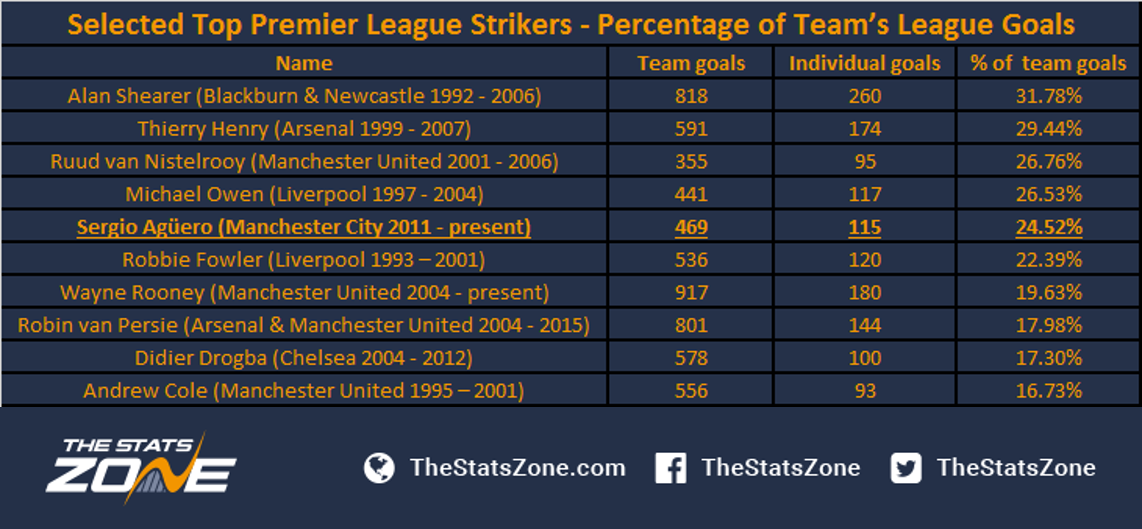
Perhaps as expected, Alan Shearer tops this chart, scoring a whopping 31.78% of Blackburn and Newcastle’s Premier League goals scored during his time there. Indeed, when his record at Blackburn is taken on its own, he scored an incredible 112 out of the 272 Premier League goals scored whilst he was at the club, which equates to a staggering 41.18%. Agüero falls somewhere in the middle of the list with 24.52%, which is better than legends such as Van Persie, Rooney, and Drogba but behind Henry, Van Nistelrooy and Owen. It should be noted however, that the total team goals figure is all goals scored by the club whilst the player was on their books, so players such as Agüero – who has missed 46 games during his time at City – will have missed a higher number of games throughout the seasons; thus affecting their overall percentage.
However, it will of course be the case that all of these players will have missed matches during their careers, especially those who played for a longer period of time. In addition, an argument can be made that those players who are really important to their team’s goal scoring capabilities will see their team scoring less goals when they are missing anyway, meaning the overall goal tally will not be affected greatly in their absence. In any event, these stats can of course be read both ways. Supporters of Agüero (or Drogba and Cole for that matter) will point out that they were part of highly free scoring teams with more competition for goals, meaning their percentage will be lower than if playing for a team with less competing strikers and less overall goals. However, the counter-argument to that is that a successful free scoring team is likely to create more chances for a striker, and therefore make it easier for them to score than if they were playing for a struggling side.
Our final measure of the striker’s impact on their clubs is by looking at the cold, hard currency of trophies. Again, it is apparent that certain players will be disadvantaged owing to the calibre of team they were playing for. However, it is worth examining which of our strikers has had the most trophy winning success whilst playing in the Premier League as after all, a player is often judged by the collective success they have achieved, rather than merely their own performances. For balance, we have included the number of Premier League Golden Boot awards each striker has won as an acknowledgment of their individual trophy success. It should be noted that we have only included trophies won whilst a Premier League player, so Thierry Henry’s Champions League win whilst at Barcelona and Robin van Persie’s Uefa Cup win whilst a Feyenoord player are not included.
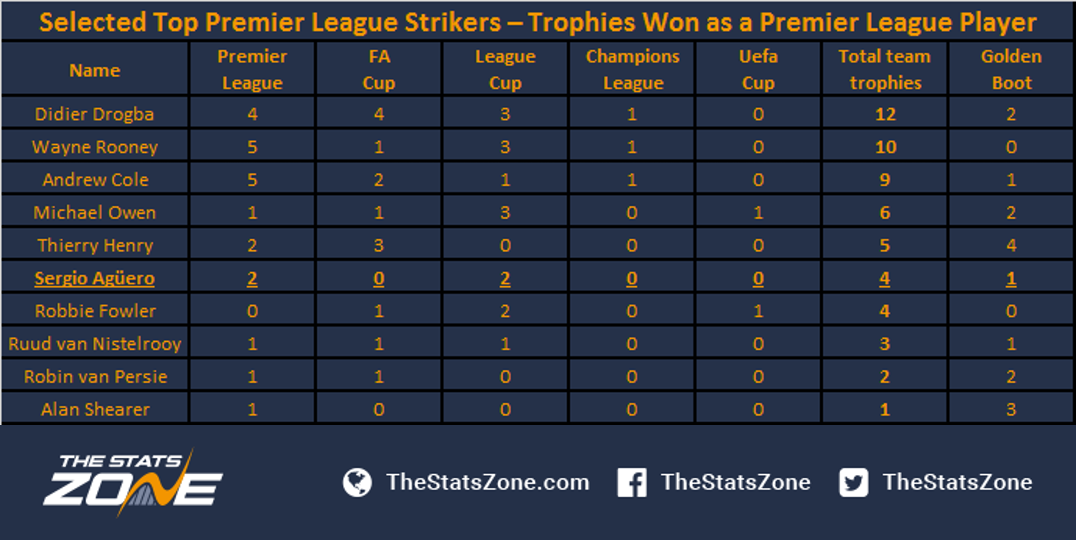
In this category, Agüero comes some way behind the leader Didier Drogba, who won 12 team trophies during his time at Chelsea along with two Golden Boots. Of course, longevity has to be a consideration and all of those above him on the list played/have played in the Premier League for longer than Agüero’s five years. However, it is worth wondering whether two league title wins in five years is an accurate reflection of both Agüero’s talent and Manchester City’s strength during this period, especially with it looking increasing unlikely that a third league title will be added to his tally this season. It is also perhaps arguable than Agüero will be disappointed to only have won the Golden Boot once during his tenure in English football although again, his regular absences during most of his five seasons may have contributed to this result.
Conclusion
What is clear from the statistics is that in almost every comparison, Sergio Agüero fares very well. His minutes per goal ratio is particularly impressive and it is not hard to imagine him adding considerably to both his goal tally, team win percentage, and trophy collection in the coming years should he continue plying his trade at City. However, it does appear unlikely that he will be able to usurp Alan Shearer’s 260 goal tally as even at his current rate of scoring (just over 20 goals a season) that would require him to play – and continue scoring - until he is 36. Given his injury record and his oft declared intention to finish his career at his boyhood club Independiente, this doesn’t appear a realistic possibility. It should be noted though, that even in his 29th year, his scoring record shows no sign of slowing just yet, with 50 goals in his last two full Premier League seasons and 13 in 22 games this season. Given a number of the strikers in our comparison were already starting to decline at this age (Michael Owen and Robbie Fowler being the prime examples), it appears Premier League defences may not be able to rest easy for some time yet. That is, unless of course Pep Guardiola has other ideas...











